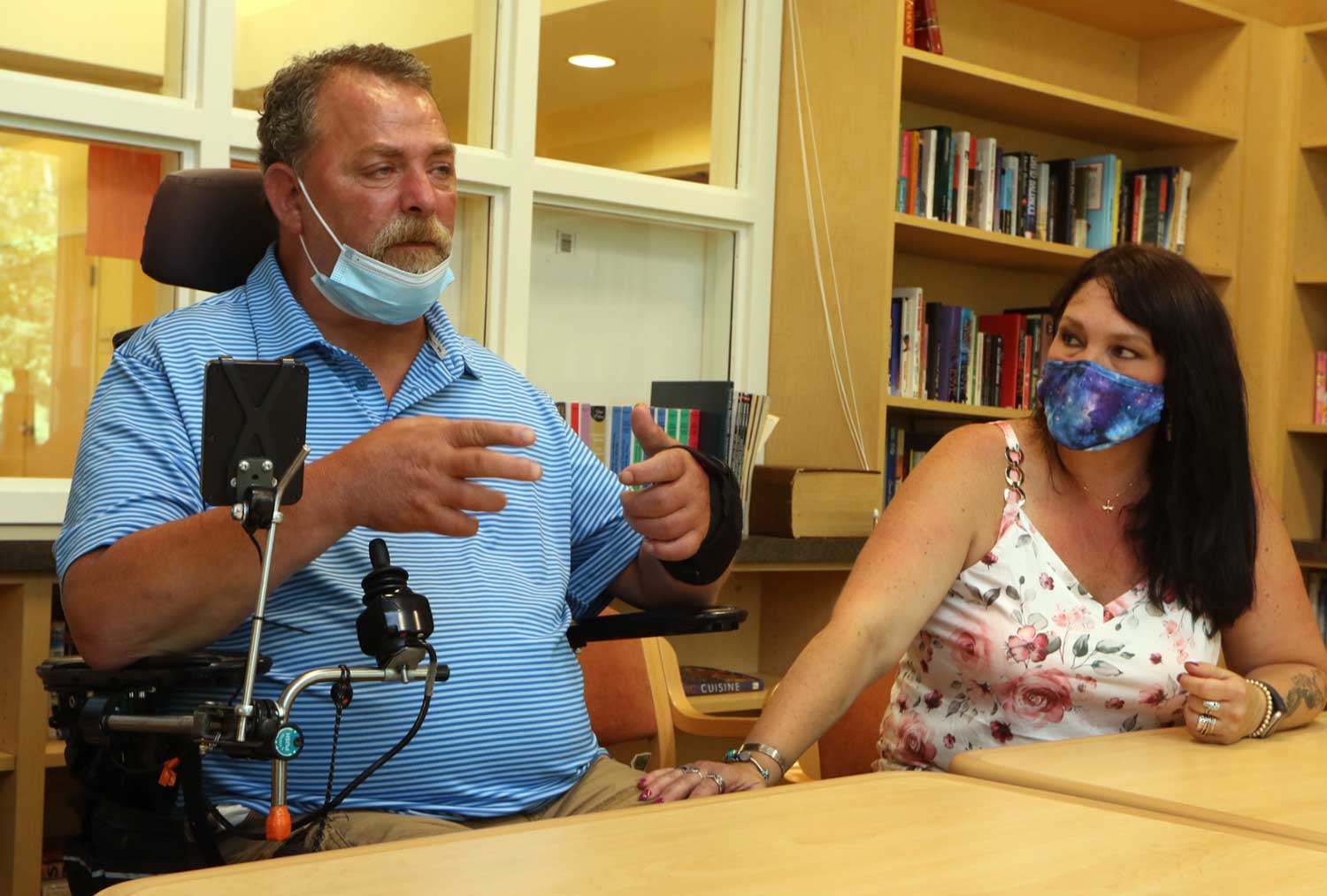Lowell couple take on spinal cord injury together

Tracy Leedberg’s story is rife with sadness, triumph, hope and perseverance.
And when Leedberg reconnected with her high school friend after more than two decades, her life came full circle. James Radcliffe found his way back to Leedberg and, in 2018, the two settled comfortably in Tyngsboro. But one year later, a devastating event left the couple in grief and turmoil.
“In July 2019, Jimmy dove into the pool and couldn’t move,” Leedberg said. “I thought he was just messing around at first.”
But he was not messing around. Radcliffe, 56, had broken his neck. The traumatic C5 injury left him paralyzed from the waist down.
Leedberg became overwhelmed by the new responsibilities in her life. She had no idea how to provide care for someone in Radcliffe’s condition, nor where to find specialized care. Moreover, she felt sadness that her once-strong construction worker partner had been rendered so immobile and helpless. It affected the couple in every aspect of life — mentally, spiritually, romantically and especially financially.
“I had to quit my job because Jimmy needed me at home,” she said. “I became a full-time caregiver.”
She did not object to this new role, but acquiesced to the fact that she needed assistance.
Hope arrived in the subtlest of gestures.
“One day, a few months after my final surgery, I was laying in bed and tried to wiggle my toe,” Radcliffe explained. “And it moved.”
This flicker of hope led him to a physical rehab center in Salem, N.H. He began making slow progress but after the months-long regimen, was released back to home care. At home, he hoped to continue his forward momentum toward recovery with the help of visiting professionals. Then came COVID-19. The home aid they had waited for was curtailed due to travel restrictions and health care protocols.
He again fell into despair. All the physical gains he had made plateaued, then began regressing. His hope and confidence atrophied as well. Leedberg’s health also took a turn as she suffered a stress-related heart attack.
“When I couldn’t care for Jimmy anymore, I became despondent,” she said. “The doctors wanted to put him into a nursing home facility. I didn’t want that and he certainly did not. I didn’t know what to do.”
As the mother of three daughters, now adults, Leedberg has experience in caregiving, but she also knows her limits and they had been reached. Financially, physically and emotionally depleted, the couple did not know where to turn.
Like most things in life, great challenges are overcome by great teamwork. And, like the cavalry, a team appeared. In a happy accident while Googling for something else, Leedberg found out about a program called Summit ElderCare. They said the Fallon Health-run program at 1081 Varnum Ave. in Lowell was the Holy Grail of treatment they had been so desperately seeking.
Fallon, a Worcester-based corporation, has five Summit ElderCare facilities throughout Massachusetts, including in Leominster. For Leedberg and Radcliffe, having one so close to home is an added blessing. The outpatient center offers comprehensive care including physical therapy, occupational therapy, regular medical exams, transportation, even at-home visits as well a social atmosphere conducive to the maintenance of mental health.
Summit ElderCare is a Program of All-inclusive Care for the Elderly, or PACE, and is exactly what Radcliffe needed.
“I started here in March and have made so much progress since then,” he said.
His hands still show signs of strength gained as a construction worker skilled in sheet-metal work. His smile comes easier now, a result of hope and progress.
“When I first got hurt, doctors said I may never walk again. That became a challenge that I intended to face,” Radcliffe said. “Since starting at Summit, I have made steady progress in my therapy.”
With each success comes more confidence.
“And with more confidence, I get more motivated,” he said.
Radcliffe enjoys the five-days-per-week visits to the center, enjoying the activities but always focused on the objective. His physical therapist, Michael Fitzgerald, is part coach and part motivator. The two have become friends, discussing football between exercises.
“At first I needed help just to sit up in bed,” Radcliffe said. “Then I made it to the chair. Over the months I am finally doing some assisted walking.”
On Wednesday, the largest step was taken. Supported only by a belt that Fitzgerald grasped to help stabilize him, Radcliffe walked across the training room floor, much to the surprise and delight of Leedberg.
The timing of this momentous step is also quite serendipitous. September is National Spinal Cord Injury Awareness Month and Radcliffe ushered that in with his proud yet labored gait.
“People don’t understand how complicated SCI care is,” Leedberg said. There are several ancillary health effects including urinary tract infections, self-confidence damage and loss of hope. “He now has hope.”
“She has been a strong advocate for me,” Radcliffe said of Leedberg. “But she is also an advocate for PACE at Summit.”
Leedberg showed appreciation of the organization by being a featured speaker at the annual MassPACE Association Annual Conference in May. She also presented her extensive research paper, “Meeting the Needs of Caregivers to Decrease Burnout.”
Dinah Olanoff, a senior business consultant for Fallon’s PACE strategy, explained how the program works.
“We try to find support that is uniquely directed for each participant. We set up a model of care for every individual,” she said, including Radcliffe.
“He was very depressed when I first met him. Now he is living his best life,” Olanoff said.
But that “best life” will not be achieved by his standards until “I can walk out of here on my own,” Radcliffe said. “I plan to get back to working.”